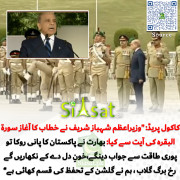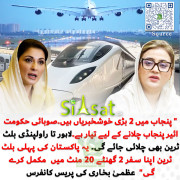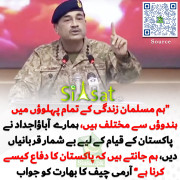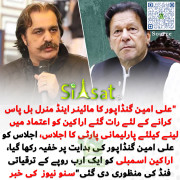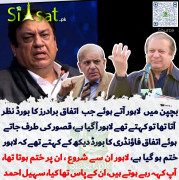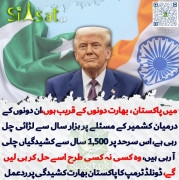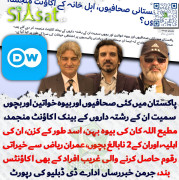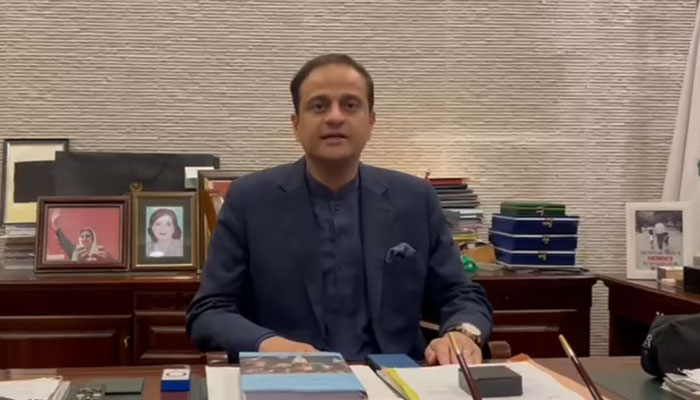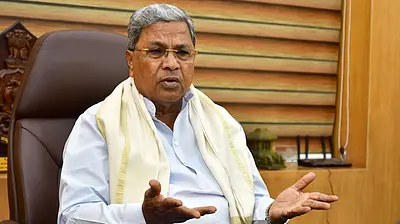Re: Press Conference by Dr. Tahir Ul Qadri
Will anybody explain what kind of doctor he is????
A man of manifold and staggering achievements, Shaykh-ul-Islam Dr Muhammad Tahir-ul-Qadri is the founding leader of Minhaj-ul-Qur’an International (MQI), an organization with branches and centres in more than 90 countries around the globe, working for the promotion of peace and harmony between communities and the revival of spiritual endeavour based on the true teachings of Islam. Shaykh-ul-Islam is a scholar of extraordinary proportions and an intellectual leader for all seasons. He is a living model of profound classical knowledge, intellectual enlightenment, practical wisdom, pure spirituality, love, harmony and humanism. He is well known for his ardent endeavour to strengthen bonds among people, by bringing them together through tolerance, dialogue, integration and education. He successfully bridges the past with his image of the future and finds convincing solutions for contemporary problems. He has been teaching Hadith, Tafsir, Fiqh, Theology, Sufism, Seerah, Islamic philosophy and many other rational and traditional sciences to thousands of people, including Ulema, scholars, Shuyukh, students, intellectuals and academics in the east and the west.

Shaykh-ul-Islam was born on February 19, 1951 in the historical city of Jhang, Pakistan, and is the son of the great spiritualist and intellectual of his time ash-Shaykh Dr Farida’d-Din al-Qadri. He was educated from the young age in both the Islamic and secular sciences simultaneously. Although he had already started his religious education under his father two years earlier, his formal classical education was initiated in Madina at the age of 12, in Madrasa al-‘Ulum ash-Shar‘iyya, which was situated in the blessed house of Sayyiduna Abu Ayyub al-Ansari, the first residence of the Holy Prophet (blessings and peace be upon him) after his migration. By the time he had received a First Class Honours Degree from the University of the Punjab in 1970, he had also completed his Classical Islamic Studies, having spent over ten years under the tutelage of his father and other eminent Shuyukh of his time and achieving an unparalleled understanding of the classical shari‘a sciences and Arabic language. He earned his MA in Islamic Studies in 1972 with the University of the Punjab Gold Medal, achieved his LLB in 1974 and began to practise as a lawyer in the district courts of Jhang. He moved to Lahore in 1978 and joined the University of the Punjab as a lecturer in law and then gained his PhD in Islamic Law. He was also a member of the Syndicate, Senate and Academic Council of the University of the Punjab, which are the highest executive, administrative and academic bodies of the University.
In a short span of time, he emerged as the country’s leading Islamic jurist and scholar and revivalist of the Islamic ideology. He was appointed as a Jurist Consult (legal adviser) on Islamic law for the Supreme Court and the Federal Shari‘a Court of Pakistan and also worked as a specialist adviser on Islamic curricula for the Federal Ministry of Education of Pakistan at various times between 1983 and 1987. In the 1980s, a number of historical judgments in the legal and constitutional history of Pakistan were passed by the Federal Shariʻa Court and the Appellate Shariʻa Bench, Supreme Court of Pakistan as a result of Shaykh-ul-Islam’s juristic arguments, documented in the Pakistan Legal Decisions (PLDs) and Pakistan Legal Judgments (PLJs).
He is also a former Professor of Islamic Law at the University of the Punjab, Lahore, Pakistan, and the youngest person ever to have been awarded a professorship in the history of the University. Shaykh-ul-Islam has also previously held the position of the Head of the Department for LLM in Islamic Legislation.
Shaykh-ul-Islam founded Minhaj-ul-Qur’an in 1981 and established its headquarters in Lahore. In less than 30 years, Minhaj-ul-Qur’an has expanded and spread over more than 90 countries around the world; and in terms of its comprehensive and all-encompassing sphere of activities, educational, social, cultural and spiritual, Minhaj-ul-Qur’an is probably one of the largest non-governmental organizations in the world.
Shaykh-ul-Islam is founder and Chairman of the Board of Governors of the Minhaj University Lahore which is chartered by Government and is imparting higher education to thousands of students in the faculties of basic, modern, social, management and religious sciences. He is the founder of Minhaj Education Society which has established more than 570 schools and colleges in Pakistan. He is also the founding Chairman of Minhaj Welfare Foundation, a humanitarian and social welfare organization working globally. He is the founding leader of different forums of Minhaj-ul-Qur’an including Minhaj-ul-Qur’an Ullama Council, Minhaj-ul-Qur’an Women League, Minhaj Youth League, Mustafavi Students Movements and Muslim Christian Dialogue Forum.
[h=1]
The Works of Shaykh-ul-Islam[/h] Shaykh-ul-Islam is a prolific author and researcher. He has authored around 1000 books out of which 400 books are already published, and the rest of them are yet to be published. An unrivalled orator and speaker, he has delivered over 5000 lectures (in Urdu, English and Arabic), on a wide range of subjects, which are available on cassette, CD, DVD formats as well as online.
The following represents a selection of his printed works:
[h=2]Works on Qur’anic Tafsir (in number totaling 80 works) include:[/h]
- Irfan al-Qur’an (the Meanings of the Qur’an — Urdu and English versions)
- Tafsir Minhaj al-Qur’an (al-Futuhat al-Madaniyya — 14 volumes U.P.)
- Tafsir Sura al-Fatiha (partly published, totaling 7 volumes), the largest available publication on this subject.
- Kashf al-Ghita ʻan Maʻrifat al-Aqsam li-l-Mustafa (Tafsir in Arabic on the excellence of the Holy Prophet — blessings and peace be upon him).
- Tasmiyya al-Qur’an (a voluminous book on the meanings of Bism Allah)
- Manahij al-‘Irfan fi Lafz al-Qur’an (a voluminous book on the meanings of the word Qur’an)
- Meaning of Ayat al-Kursi (a voluminous book)
- Development of Human Personality in the Light of Sura al-Fatiha
- Islamic Philosophy of Human Life
- No Coercion in Religion
- al-ʻIrfan fi Fadaʼil wa Adab al-Qurʼan (recitation of the Qur’an; virtues and manners)
- Islamic Concept of Human Nature
- Qur’anic Philosophy of Da‘wa
And many others
[h=2]Works on Hadith compilation and the science of Hadith (in number totaling 100 works):[/h]
- Jami‘ as-Sunna fi ma Yahtaj Ilayhi Akhir al-Umma (a comprehensive compilation of 25,000 ahadith, totaling 20 volumes U.P.)
- al-Minhaj as-Sawiyy min al-Hadith an-Nabawiyy (4 volumes — collection of 5,000 ahadith compiled on the pattern and style of al-Imam an-Nawawi’s Riyad as-Salihin and al-Khatib at-Tabrizi’s Mishkat al-Masabih relevant to the modern age). Its abridged version Mukhtasar Al-Minhaj as-Sawiyy was published with compliments and tributes of Shaykh al-Azhar as-Sayyid Dr Muhammad Tantawi, a renowned Muhaddith of Egypt, ash-Shaykh Dr Ahmad ‘Umar Hashim, Ex-Vice Chancellor of Jami‘a al-Azhar, Cairo, and Grand Mufti of Egypt ash-Shaykh Dr ‘Ali Jumu‘a and others.
- al-‘Ata fi Ma‘rifat al-Mustafa (4 volumes — collection of 5,000 ahadith on the subjects of the excellence, habits, morals, specialties and miracles of the Holy Prophet — blessings and peace be upon him — on the pattern and style of ash-Shifa of al-Qadi ‘Iyad U.P.)
- Hidayat al-Umma ‘ala Minhaj al-Qur’an wa’s-Sunna (2 volumes — another collection of 2,200 ahadith)
- Prophetic Virtues & Miracles
- Al-Wafa fi Rahmat an-Nabi al-Mustafa
- Al-Makana al-‘Aliyya fi’l-Khasa’is an-Nabawiyya
- Al-Mizat an-Nabawiyya fi’l-Khasa’is ad-Dunwiyya
- Al-‘Azama an-Nabawiyya fi’l-Khasa’is al-Barzakhiyya
- Al-Futuhat an-Nabawiyya fi’l-Khasa’is al-Ukhrawiyya
- Al-Jawahir an-Naqiyya fi ash-Shuma’il an-Nabawiyya
- Al-Matalib as-Saniyya fi’l-‘Adat an-Nabawiyya
- Al-Minahat as-Samadiyya fi’l-Ikhtiyarat an-Nabawiyya
- Al-Imtiyazat an-Nabawiyya fi’l-‘Ulum al-Ghaybiyya
- Al-Fawz al-Jali fi at-Tawassul bi’n-Nabi
- Ash-Sharaf al-‘Ali fi at-Tabarruk bi’n-Nabi
- an-Nur al-Mubin fi Hayat an-Nabi al-Amin
- Al-Minhal as-Safi fi Ziyarat Qabr an-Nabi
- Ghayat as-Sifa fi Husn Jasad al-Mustafa
- Al-‘Asal an-Naqi fi Asma’ an-Nabi
- an-Najaba fi Manaqib as-Sahaba wa’l-Qaraba (virtues of the Companions and the Family of the Holy Prophet [blessings and peace be upon him])
- Rawdat as-Salikin fi Manaqib al-Awliya’ wa’s-Salihin (Virtues of the Friends of Allah and the Pious)
- Ahsan ’s-Sana’a fi Ithbat ash-Shafa’a (Intercession)
- Rahat al-Qulub fi Madhi ’n-Nabiyyi al-Mahbub (Hymn of the Holy Prophet [blessings and peace be upon him])
- Kashf al-Asrar fi Mahabbat al-Mawjudat li-Sayyid al-Abrar
- al-Badra’t-Tamam ‘ala Sahib’id-Dunuww wa’l-Maqam (virtues of Greetings and Salutations on the Holy Prophet [blessings and peace be upon him])
- Ahsana’s-Subul fi Manaqib al-Anbiya’ wa’r-Rusul (virtues of the Prophets and Messengers)
- as-Sayf al-Jali ‘ala Munkir Wilayat ‘Ali
- al-Qawl al-Mu‘tabar fi’l-Imam al-Muntazar
- al-Qawl al-Qawiyy fi Sama‘ al-Hasan ‘an ‘Ali (a book on the science of Hadith in Arabic language. It establishes the fact that al-Hasan of Busra met ‘Ali and heard him narrate traditions.)
- al-Kanz ath-Thamin fi Fadilat adh-Dhikr wa’dh-Dhakirin (Pearls of Remembrance)
- al-Khutba as-Sadida fi Usul al-Hadith wa Furu‘ al-‘Aqida (a brief textbook on the science of Hadith in the Arabic language)
- al-‘Abdiyya fi’l-Hadrat as-Samadiyya (Rights of Allah on His Slaves)
- Al-Marwiyyat as-Sulamiyya min al-Ahadith an-Nabawiyya
- Al-Marwiyyat al-Qushayriyya min al-Ahadith an-Nabawiyya
- Al-Marwiyyat as-Suhrawardiyya min al-Ahadith an-Nabawiyya
- Marwiyyat ash-Shaykh al-Akbar min Ahadith an-Nabi al-Athar
- al-Lubab fi’l-Huquq wa’l-Adab (Rights and Manners)
- Righteous Character & Excellence of Social Interaction
- An-Najah fi A‘mal al-Birr wa as-Sadaqa wa as-Salah
- Ad-Da‘wat wa’l-Adhkar min Sunna an-Nabi al-Mukhtar
- al-Futuhat fi’l-Adhkar ba‘d as-Salawat
- Al-Manahil as-Safiyya fi Sharaf al-Umma al-Muhammadiyya
- Imam Abu Hanifa: Imam al-A’imma fi’l-Hadith (4 volumes)
And many others
[h=2]Works on Islamic ‘Aqida (in number totaling 100 works) include:[/h]
- Majmu‘at al-‘Aqa’id (25 volumes — an unprecedented compendium on Islamic Faith and Theology)
- Kitab at-Tawhid (a detailed treatise on the concept of the unity of Allah running into 2 volumes)
- Kitab ar-Risala (2 volumes — a detailed treatise on the excellence of Prophethood and highly esteemed station of the Holy Prophet — blessings and peace be upon him)
- Kitab as-Sunna (2 volumes — a comprehensive treatise on the authority, science and compilation of hadith and sunna)
- Makanat ar-Risala wa’s-Sunna
- Kitab al-Bid‘a (a comprehensive work on the concept of “innovations” in Islam)
- Kitab al-Iman (Basic Tenets of Faith)
- Kitab al-Islam (Pillars of Islam)
- Kitab al-Ihsan (Book on Spiritual Excellence)
- Kitab az-Ziyara (Book on Visiting the Graves)
- Kitab al-Baraka (Book on Blessings)
- Kitab ash-Shafa‘a (Book on Intercession)
- Kitab at-Tawassul (Book on Intermediation)
- at-Ta‘zim wa’l-‘Ibada (Reverence and Worship)
- al-Wasa’it ash-Shar‘iyya (Lawful Means and Linkages)
- Reverence of Prophethood
- Finality of Prophethood
- al-Mawlid an-Nabawiyy ([blessings and peace be upon him)] Celebration of Mawlid] The largest ever written work on this subject, consisting of approximately 850 pages)
- ‘Ilm al-Ghayb (Book on the Knowledge of the Unseen)
- Ascension of the Holy Prophet (blessings and peace be upon him)
- Love and Reverence of the Holy Prophet (blessings and peace be upon him)
- The Central Point of Iman
- Prisoners of the Beauty of Muhammad (blessings and peace be upon him)
And many others
[h=2]Works on the Biography (Sira) of the Holy Prophet (blessings and peace be upon him) and his virtuous characteristics:[/h]
- Sirat ar-Rasul (collection of 14 volumes, the largest collection ever written in the Urdu language)
- Muqaddima as-Sira (2 volumes — an unprecedented work in Islamic history on the pattern of Muqaddima Ibn Khaldun)
- Khasa’is al-Mustafa (Holy Prophet’s Exclusive Virtues)
- Shama’il al-Mustafa (Holy Prophet’s Personal Characteristics and Habits)
- Asma’ al-Mustafa (Meanings and Interpretation of the Holy Prophet’s Names)
- Dala’il al-Barakat (2500 styles of greetings and salutations on the Holy Prophet — blessings and peace be upon him — a masterpiece of Arabic literature, written in the style of the well-read Dala’il al-Khayrat of Imam Jazuli)
- Political Aspect of the Prophet’s Sira
- Economic Aspect of the Prophet’s Sira
- Administrative Aspect of the Prophet’s Sira
- Constitutional Aspect of the Prophet’s Sira
- Scientific Aspect of the Prophet’s Sira
- Cultural Aspect of the Prophet’s Sira
- Historical Aspect of the Prophet’s Sira
- Aspect of Human Rights in the Prophet’s Sira
- Aspect of Peace and Integration in the Prophet’s Sira
- Diplomatic Relations in the Prophet’s Sira
- Relations to Non-Muslims in the Prophet’s Sira
- Revolutionary Struggle in the Prophet’s Sira
- Qur’an on the Characteristics of the Holy Prophet (blessings and peace be upon him)
And many others
[h=2]Works on Islamic Law and Jurisprudence (Fiqh and Usul al-Fiqh) totaling around 60 works:[/h]
- Islamic Penal System and Philosophy (Shaykh-ul-Islam’s doctoral thesis)
- Islamic Concept of Law
- Salient Characteristics of Islamic Law
- Islamic Concept of Crime
- A Comparative Study of Islamic and Western Concepts of Law
- Islam and Criminality
- Legal Character of Islamic Punishments
- al-Hukm ash-Shar‘i (a book on Usul al-Fiqh [Islamic jurisprudence])
- Sources of Islamic Law
- Philosophy of Ijtihad and the Modern World
- Ijtihad — Meaning, Kinds and Scope
- Jurisprudential Methodology of Islamic Research
- Islamic Concept of State
- Qur’anic Basis of Constitutional Theory
- Concept of Jail and Imprisonment in Islam
- Difference between the Text and its Exegesis
And many others
[h=2]Works on Islamic Political and Economic Systems:[/h]
- The Constitution of Madina (a detailed exposition of the first ever written constitution in human history)
- Khilafa and Democracy (a voluminous work on the subject of Islamic Political System U.P.)
- Islamic Economic System, its Origin and Development
- Qawa‘id al-Iqtisad fi’l-Islam ([Arabic] Principles of Islamic Economics)
- Qur’anic Philosophy of Change (2 volumes)
- Islamic Economy and Interest-free Banking
- Qur’anic Philosophy of Rise and Fall of the Nations
- Islam — a Religion of Balance and Moderation
- Nizam Mustafa: a Message and Struggle for Change
- Objectives of the Raising of Prophets (blessings and peace be upon them)
And many others
[h=2]Works on Tasawwuf and Spirituality; around 50 works on Islamic Science of Mysticism and Spiritualism:[/h]
- Kitab al-Ihsan
- Reality of Tasawwuf
- Practical Code of Spirituality
- Obedience to Allah
- Pearls of Remembrance of Allah
- Love of Allah
- Wariness of Allah
- The Beauty of Pious Deeds
- The Beauty of Spiritual States
- The Beauty of Good Morals
- Purification of Heart and Soul
- Corruption of the Heart and its Cure
- Our Real Homeland
- Sin and Repentance
- Qur’anic Categorization of People
- Deeds and Spiritual Intoxication
- Life — a War between Good and Evil
- Morality of Prophets (blessings and peace be upon them)
- The Awliya’: Companies and Narrations
- al-Fuyudat al-Muhammadiyya
And many others
[h=2]Works on Human Rights and Modern Sciences:[/h]
- Human Rights in Islam
- Islam on the Rights of Women
- Islam on the Rights of Children
- Islam on the Rights of Senior Citizens
- Islam on the Rights of Non-Muslims
- Islam on the Rights of the Disabled
- Islam and Science
- Qur’an on Creation and Evolution of Man
- Qur’an on Creation and Expansion of the Universe
- Islam on Prevention of Heart Diseases
- Spiritualism and Magnetism
- Issues of the Modern Age and their Solutions
And many others
[h=2]Miscellaneous Works:[/h]
- Islam in Various Perspectives
- How to end Extremism and Sectarianism?
- Our Religious Downfall and its Trifold Defence Strategy
- Multidimensional Attack on Iman
- The Real Concept of Jihad
- Jihad: a Charity
- Islamic Concept of Knowledge
- True Knowledge: a Creative or an Interpretative Phenomenon
- Reformable Aspects of Religious and Secular Sciences
- The Real Base of Piety
And many others
[h=2]Fatwa on Suicide Bombings and Terrorism:[/h] Shaykh-ul-Islam Dr Muhammad Tahir-ul-Qadri issued a historic fatwa, or Islamic decree, on the vital matter of suicide bombings and terrorist attacks carried out in the name of Islam. It is regarded as a significant and historic step, the first time that such an explicit and unequivocal decree against the perpetrators of terror has been broadcast so widely. The original fatwa has been written in Urdu, and amounts to 600 pages of research and references from the Qur’an, Hadith, opinions of the Companions (of the Prophet), and the widely accepted classical texts of Islamic scholarship. The comprehensiveness and extent of the original work is meant to leave no doubt, and no stone unturned, in order to remove any possible justification for the suicide attacks that the perpetrators or their supporters may offer. Indeed, Shaykh-ul-Islam went that crucial step forward and announced categorically that suicide bombings and attacks against civilian targets were not only condemned by Islam, but rendered the perpetrators totally out of the fold of Islam, in other words, to be unbelievers. Furthermore, in what is unprecedented in recent Islamic scholarship, this work draws out scriptural, historical, and classical scholarly references highlighting the obligations of Governments of Islamic nations to deal decisively to root out terrorist elements from society. This historic work has been translated into major languages of the world.
[h=1]
Shaykh-ul-Islam’s Chains of Authority[/h] His Eminence Shaykh-ul-Islam, Dr Muhammad Tahir-ul-Qadri has received a large number of authorities (asanid) and permissions (ijazat) for the transmission of knowledge of hadith, tafsir, fiqh, tasawwuf and other classical Islamic sciences from numerous great pillars of the Muslim world, widely acknowledged as the fountains of Islamic knowledge in the last century back to the classical scholars and great Imams of hadith of the past up to the Holy Prophet (blessings and peace be upon him). He has more than 300 Chains of Authority contained in two of his own thabats (reference books on his chains of authority):
- al-Jawahir al-Bahira fi’l Asanid at-Tahira
- as-Subul al-Wahabiyya fi’l-Asanid adh-Dhahabiyya
The following are some examples of his links to the renowned classical scholars via only one teacher:
- He is linked to al-Imam Yusuf ibn Isma‘il an-Nabhani directly via only one teacher, his student ash-Shaykh Husayn ibn Ahmad al-‘Usayran (Lebanon).
- He is linked to al-Imam Imdad Allah al-Muhajir al-Makki via only one teacher, his vicegerent ash-Shaykh as-Sayyid ‘Abd al-Ma‘bud al-Jilani al-Madani (who died at the age of 165 years).
- Shaykh-ul-Islam is linked to Imam al-Hind ash-Shah Ahmad Rida Khan via only one teacher through three different routes:
- ash-Shaykh al-Mu‘ammar Diya’ud-Din Ahmad al-Qadiri al-Madani
- ash-Shaykh as-Sayyid Abu’l-Barakat Ahmad al-Qadiri Alwari
- ash-Shaykh al-Mu‘ammar as-Sayyid ‘Abd al-Ma‘bud al-Jilani al-Madani
Shaykh-ul-Islam Dr Muhammad Tahir-ul-Qadri has gathered together the various fields of classical Islamic knowledge, especially the knowledge, and authorities of hadith, from famous centres of Islamic learning across the globe:
[h=2]1. Authorities of the great Shuyukh of Makka and Madina[/h]
- al-Imam ‘Umar ibn Hamadan al-Mahrasi
- al-Imam Muhammad ibn ‘Ali ibn Zahir al-Watri
- al-Imam Ahmad ibn Isma‘il al-Barzanji
- al-Imam Ahmad Sharif ibn Muhammad as-Sanusi al-Madani
- al-Imam Ahmad ibn Zayni Dahlan
- ash-Shaykha Amat Allah bint al-Imam ‘Abd al-Ghani al-Muhaddith ad-Dihlawi al-Madani
Shaykh-ul-Islam received the authorities of the above mentioned through:
- Muhaddith al-Haram ash-Shaykh ‘Alawi ibn ‘Abbas al-Maliki al-Makki (father of ash-Shaykh as-Sayyid Muhammad ibn ‘Alawi al-Maliki). (He had sama‘ from him in 1963.)
- ash-Shaykh al-Mu‘ammar Diya’ud-Din Ahmad al-Qadiri al-Madani (died at the age of over 100 years)
- ash-Shaykh Husayn ibn Ahmad al-‘Usayran (Lebanon — died at the age of 100 years)
- ash-Shaykh Dr Farida’d-Din al-Qadri (father of Shaykh-ul-Islam)
[h=2]2. Authorities of the great Shuyukh of Baghdad[/h]
- al-Imam ‘Abd ar-Rahman ibn ‘Ali an-Naqib al-Baghdadi (Imam al-Awliya’ and Hujjat al-Muhaddithin of his era)
- al-Imam ‘Abd as-Salam al-Muhaddith al-Afandi al-Baghdadi
- al-Imam ‘Abd ar-Razzaq al-Bazzaz al-Muhaddith al-Baghdadi back to al-Imam as-Sayyid Mahmud ibn ‘Abd Allah al-Alusi (author of Tafsir Ruh al-Ma‘ani)
Shaykh-ul-Islam received the authorities of the above mentioned through:
- ash-Shaykh as-Sayyid Tahir ‘Ala’ud-Din al-Jilani al-Baghdadi al-Afandi
- ash-Shaykh as-Sayyid ‘Alawi ibn ‘Abbas al-Maliki al-Makki
- ash-Shaykh as-Sayyid ‘Abd al-Ma‘bud al-Jilani al-Madani
- ash-Shaykh Dr Farida’d-Din al-Qadri
[h=2]3. Authorities of the great Shuyukh of ash-Sham (Syria)[/h]
- Muhaddith ash-Sham al-Imam Muhammad ibn Ja‘far al-Kittani
- Muhaddith ash-Sham al-Imam Muhammad Badra’d-Din ibn Yusuf al-Hasani
- al-Imam ‘Abd al-Hayy ibn ‘Abd al-Kabir al-Muhaddith al-Kittani
- al-Imam Abu’l-Makarim Muhammad Amin as-Suwayd ad-Dimashqi
Shaykh-ul-Islam received the authorities of the above mentioned through:
- ash-Shaykh Husayn ibn Ahmad al-‘Usayran (Lebanon)
- ash-Shaykh as-Sayyid Muhammad al-Fatih ibn Muhammad al-Makki al-Kittani (Damascus)
- ash-Shaykh Dr Farida’d-Din al-Qadri
[h=2]4. Authorities of the great Shuyukh of Lebanon and Tarabulus[/h]
- al-Imam Yusuf ibn Isma‘il an-Nabhani (Imam al-Muhaddithin of the last century)
- al-Imam ‘Abd al-Qadir ash-Shalabi at-Tarabulusi
- al-Imam Hasan ‘Uwaydan al-Fayturi al-Tarabulusi
Shaykh-ul-Islam received the authorities of the above mentioned through:
- ash-Shaykh Husayn ibn Ahmad al-‘Usayran (Lebanon)
- ash-Shaykh as-Sayyid Muhammad al-Fatih ibn Muhammad al-Makki al-Kittani (Damascus)
- ash-Shaykh Dr Farida’d-Din al-Qadri
[h=2]5. Authorities of the great Shuyukh of al-Maghrib and ash-Shanqit (Mauritania):[/h]
- al-Imam Abu ‘Abd Allah Muhammad ibn Mustafa Ma’ul ‘Aynayn ash-Shanqiti
- al-Imam Muhammad Habib Allah ash-Shanqiti
- al-Imam Muhammad al-‘Arabi ibn Muhammad al-‘Azizi al-Fasi
- al-Imam ‘Abd Allah ibn Siddiq al-Ghimari al-Maghribi
Shaykh-ul-Islam received the authorities of the above mentioned through:
- ash-Shaykh as-Sayyid ‘Alawi ibn ‘Abbas al-Maliki al-Makki
- ash-Shaykh Husayn ibn Ahmad al-‘Usayran (Lebanon)
- ash-Shaykh as-Sayyid Muhammad al-Fatih ibn Muhammad al-Makki al-Kittani
- ash-Shaykh Dr Farida’d-Din al-Qadri
[h=2]6. Authorities of the great Shuyukh of Yemen:[/h]
- ash-Shaykh al-Habib Hamza ibn ‘Umar al-‘Aydarus al-Habashi
- ash-Shaykh al-Habib ‘Ali ibn ‘Abd ar-Rahman al-Habashi
- ash-Shaykh ‘Abd al-Qadir ibn Ahmad as-Saqaf
- ash-Shaykh ‘Abd Allah ibn Ahmad al-Haddad
- ash-Shaykh Hasan ibn Ahmad al-Ahdal al-Yamani
- ash-Shaykh Muhammad ibn Yahya al-Ahdal al-Yamani
- ash-Shaykh Isma‘il al-Yamani (author of Nafas ar-Rahman)
Shaykh-ul-Islam received the authorities of the above mentioned through:
- ash-Shaykh as-Sayyid ‘Alawi ibn ‘Abbas al-Maliki al-Makki
- ash-Shaykh Muhammad ibn ‘Alawi al-Maliki al-Makki
- ash-Shaykh Dr Farida’d-Din al-Qadri
[h=2]7. Authorities of the great Shuyukh of al-Hind (India and Pakistan):[/h]
- Imam al-Hind ash-Shah Ahmad Rida Khan
- Abu’l-Hasanat al-Imam ‘Abd al-Hayy ibn ‘Abd al-Halim al-Muhaddith al-Laknawi (Faqih al-Hind and Shaykh of Arab and non-Arab)
- al-Imam ‘Abd al-Baqi ibn ‘Ali al-Ansari al-Muhaddith al-Laknawi al-Madani (up to al-Imam Shah Waliyy Allah al-Muhaddith ad-Dihlawi)
- ash-Shaykh ‘Abd al-Hadi ibn ‘Ali al-Ansari al-Muhaddith al-Laknawi
- al-Imam al-Muhaddith al-Musnid Irshad Husayn Rampuri
- al-Imam ash-Shah Imdad Allah al-Muhajir al-Makki (a great saint and shaykh of Mawlana Ashraf ‘Ali Thanwi, Mawlana Rashid Ahmad Ganguhi, Mawlana Muhammad Qasim Nanutwi and others)
- Muhaqqiq al-Hind al-Imam Fadl al-Haqq al-Khayrabadi
- ash-Shaykh as-Sayyid Didar ‘Ali ash-Shah al-Muhaddith Alwari
- Muhaddith al-Hind ash-Shaykh Muhammad Anwar ash-Shah al-Kashmiri (author of Fayd al-Bari)
- Muhaddith al-Hind ash-Shaykh Ahmad ‘Ali Saharanpuri
- ash-Shaykh ‘Abd ash-Shukur al-Muhaddith al-Muhajir al-Madani
- ash-Shaykh Badr al-‘Alam Mirathi
Shaykh-ul-Islam received the authorities of the above mentioned through:
- ash-Shaykh al-Mu‘ammar Diya’a‘d-Din Ahmad al-Madani (he died at the age of over 100 years)
- ash-Shaykh as-Sayyid ‘Abd al-Ma‘bud al-Jilani al-Madani (he died at the age of 165 years)
- al-Muhaddith al-A‘zam ash-Shaykh Sardar Ahmad al-Qadiri (Faisalabad)
- ash-Shaykh as-Sayyid Abu’l-Barakat al-Muhaddith Alwari (Lahore)
- ash-Shaykh as-Sayyid Ahmad Sa‘id al-Kazimi Amruhi (Multan)
- ash-Shaykh Dr Farida’d-Din al-Qadri
- ash-Shaykh ‘Abd ar-Rashid ibn Qutba’d-Din al-Qadiri ar-Ridawi
- ash-Shaykh Dr Burhan Ahmad al-Faruqi
[h=2]8. An unprecedented chain of authority:[/h] Finally, the most unprecedented, unique, highly blessed and honoured chain of authority that his Eminence Shaykh-ul-Islam possesses is through only four Shuyukh between Shaykh-ul-Islam and the great Imams listed below:
- Sayyiduna ‘Abd ar-Razzaq ibn Sayyiduna al-Ghawth al-A‘zam ash-Shaykh ‘Abd al-Qadir al-Jilani al-Hasani al-Husayni (Baghdad)
- al-Imam ash-Shaykh al-Akbar Muhya’d-Din ibn al-‘Arabi (author of al-Futuhat al-Makkiyya) (Damascus)
- al-Imam Ibn al-Hajar al-‘Asqalani, the greatest authority on hadith (Egypt)
His Eminence Shaykh-ul-Islam’s continuous chain of authority (isnad) up to the above mentioned great Imams is as under:
- Shaykh-ul-Islam narrates (with direct permission and authority) from ash-Shaykh Husayn ibn Ahmad al-‘Usayran (Lebanon).
- He narrates from ash-Shaykh ‘Abd al-Hayy ibn ash-Shaykh ‘Abd al-Kabir al-Kittani.
- He narrates from ash-Shaykh al-Mu‘ammar ‘Abd al-Hadi ibn al-‘Arabi al-‘Awwad.
- He narrates from al-Imam as-Sayyid ‘Abd al-‘Aziz al-Hafid al-Habashi. He was born in 581 (Hegira) and died in 1276 (Hegira) and lived up to 695 years. He directly studied under, and narrated from, al-Imam ‘Abd ar-Razzaq al-Jilani ibn Sayyiduna Ghawth al-‘Azam al-Jilani at Baghdad, from al-Imam ash-Shaykh al-Akbar Muhya’d-Din ibn al-‘Arabi at Damascus and from al-Imam ibn al-Hajar al-‘Asqalani at Egypt. (al-Imam ‘Abd al-Hayy al-Kittani, Fahras al-Faharis wa’l-Athbat, vol. 2, p. 928).
His Eminence Shaykh-ul-Islam has received the same authority and ijazat of transmission from another chain:
- His Eminence narrates from ash-Shaykh Husayn ibn Ahmad al-‘Usayran.
- He narrates from ash-Shaykh as-Sayyid Ahmad ibn Muhammad as-Sanusi al-Madani.
- He narrates from ash-Shaykh as-Sayyid Muhammad ibn Muhammad as-Sanusi.
- He narrates from ash-Shaykh as-Sayyid Muhammad ibn ‘Ali as-Sanusi.
- He narrates from al-Imam ‘Abd al-‘Aziz al-Hafid al-Habashi, who received from all of the above mentioned three great Imams.
[h=1]
Leading Islamic Scholars who have received ijazat (License to Transmit) from Shaykh-ul-Islam[/h] The following is a selective list of some leading Islamic scholars who have received authority to transmit from Shaykh-ul-Islam Dr Muhammad Tahir-ul-Qadri:
- Damascus, Syria: ash-Shaykh As‘ad Muhammad as-Sa‘id as-Sagharji (a great scholar of hadith sciences and fiqh and the author of the famous work al-Fiqh al-Hanafi wa Adillatuh. He is the grand Imam of the renowned Jami‘ al-Masjid al-Umawiyy — the Umayyad Mosque of Damascus).
- Kuwait: ash-Shaykh al-Sayyid Yusuf as-Sayyid Hashim ar-Rifa‘i (world’s renowned scholar and ash-Shaykh of tariqa)
- Halab, Syria: ash-Shaykh as-Sayyid Dr Abu’l-Huda al-Husayni al-Halabi
- Damascus, Syria: ash-Shaykh Abu’l-Khayr ash-Shukri (khatib of Umayyad Mosque of Damascus and head of the famous institute of advanced hadith studies opened by al-Muhaddith al-Akbar Imam Badra’d-Din al-Hasani, called Jami‘ al-Muhaddith al-Akbar)
- Damascus, Syria: ash-Shaykh Muhammad Nadim an-Nadman
- Damascus, Syria: ash-Shaykh ‘Abdu’llah ‘Abd al-‘Aziz ‘Azw
- Damascus, Syria: ash-Shaykh Husayn Muhammad Ibrahim
- Damascus, Syria: ash-Shaykh Ahmad Qarw
- Damascus, Syria: ash-Shaykh Mahmud ‘Abd ar-Rahman Daqqaq
- Syria: ash-Shaykh as-Sayyid Ghiyath ibn Muhammad ‘Uthman ad-Dusuqi al-Husayni al-Qadiri ar-Rifa‘i ash-Shami
- Baghdad, Iraq: ash-Shaykh Dr ‘Abd ar-Razzaq as-Sa‘di (Grand Mufti of Iraq prior to March 2003)
- Baghdad, Iraq: ash-Shaykh ‘Abd al-Wahhab al-Mashhadani (a famous scholar of Islamic jurisprudence and a renowned author)
- Cairo, Egypt: ash-Shaykh Hammadun Ahmad ibn ‘Abd ar-Rahim al-Azhari
- Cairo, Egypt: ash-Shaykh ‘Abd al-Muqtadir ibn Muhammad al-‘Alawan al-Azhari
- Cairo, Egypt: ash-Shaykh Yusuf Yunus Ahmad ‘Abd ar-Rahim al-Azhari
- Cairo, Egypt: as-Sayyid Hamid Mahmud Ahmad Mahmud al-Azhari
- Cairo, Egypt: ash-Shaykh as-Sayyid Ahmad ‘Abdu’llah Muhammad ‘Abd al-Jayyid al-Azhari
- Cairo, Egypt: ash-Shaykh as-Sayyid ‘Abd al-Wahid Yusuf Muhammad al-Azhari
- Beirut, Lebanon: ash-Shaykh Dr as-Sayyid Wasim al-Habbal
- Tarim, Yemen: ash-Shaykh as-Sayyid al-Habib ‘Umar Salim ibn al-Hafiz (Hadhramaut). He is one of the most popular Arab scholars, preachers and spiritual teachers. He is the founding principal of Dar al-Mustafa al-Karim (Yemen). Shaykh-ul-Islam exchanged the asanid and ijazat with him.
- Tarim, Yemen: ash-Shaykh as-Sayyid al-Habib ‘Ali al-Jifri. He is one of the most popular Ahl as-Sunna scholars of the Arab world. He has studied from great scholars in the Arab world and was one of the closest students of the late as-Sayyid Muhammad ibn ‘Alawi al-Maliki al-Makki. He is a famous sufi teacher of the Ba ‘Alawi Tariqa of sufism, which is widely followed in Hadhramaut (Yemen) and Hijaz (Saudi Arabia).
- Tarim, Yemen: ash-Shaykh al-Habib ‘Ali Mashhur ibn Salim ibn al-Hafiz. He is the Imam of the Tarim Mosque, a Grand Mufti and head of the Fatwa Council in Tarim, Yemen.
- Tarim, Yemen: ash-Shaykh Sayf ‘Ali al-‘Asri
- Sana‘a, Yemen: ash-Shaykh Jabrayn ibn Ibrahim as-San‘ani
- Mauritania: ash-Shaykh Muhammad al-Amin ash-Shanqiti
- Hyderabad, India: ash-Shaykh Muhammad Amin ash-Sharif (Shaykh al-Hadith of Jami‘a an-Nizamiyya, Hyderabad Deccan, India)
- Dhaka, Bangladesh: ash-Shaykh al-Hadith Mawlana Habib ar-Rahman Silhati
- Bangladesh: Mawlana Ruh al-Amin, executive editor of the second largest newspaper of Bangladesh The Inqilab and he is the president of Minhaj-ul-Quran International, Bangladesh.
- East Africa/UK: Dr ‘Irfan Ahmad al-‘Alawi. He is a university lecturer, Bar at Law, CPhil PhD, Lecturer in Islamic Theology and tasawwuf (Islamic spirituality). He is a student of ash-Shaykh as-Sayyid Muhammad ibn ‘Alawi al-Maliki (Makka). He is the executive director of Islamic Heritage and also a writer for many Islamic journals across the world. He has translated many works into Arabic, English and Swahili.
- UK: ash-Shaykh Babikr Ahmad Babikr. He has been actively involved in ad-da‘wa in the UK since the 1970s. He studied the Islamic sciences in Sudan under ash-Shaykh Fatih Qaribu’llah.
- Canada: ash-Shaykh Faysal ‘Abd ar-Razzaq (Imam and president of the Islamic Forum of Canada). From 1977-1986 he studied in Saudi Arabia, first at Umm al-Qura University in Makka, then at King ‘Abd al-‘Aziz University in Jeddah. He also studied at York University, Toronto, Canada. He has spoken on a wide range of Islamic topics in many countries including Canada, USA, UK, Germany, Pakistan, India, Saudi Arabia, Jordan, Turkey, Syria, Guyana, Barbados and Trinidad. He has to his credit more than one hundred titles recorded on audio and video. Ash-Shaykh Faysal is also a prolific writer of Islamic books.
And thousands from many countries, including Pakistan, Lebanon, Syria, Egypt, Yemen, Baghdad, Sudan, Jordan, UAE, East Africa, India, Bangladesh and other countries.
[h=1]
Significance of Isnad (chain of authority and transmission of knowledge)[/h]
- Al-Hakim reports through Thabit ibn Qays, that the Holy Prophet (blessings and peace be upon him) said to his Companions:
“You (the Sahaba) are listening and receiving from me and people (at-Tabi‘un i.e. the Successors) will listen and receive from you. Then people (the atba‘ at-tabi‘in) will listen and receive from those (the Successors) who listened and received from you. Then people (the fourth generation) will listen and receive from those (the atba‘ at-tabi‘in) who were the audience and recipient of the Successors, who had listened and received from you.”
[Related by al-Hakim in Ma‘rifa ‘Ulum al-Hadith, p. 60.]
- According to ‘Abdu’llah ibn Mas‘ud (may Allah be well pleased with him), the Messenger of Allah (Allah bless him and give him peace) said:
“May Allah brighten a man who listened from us something and then passed it on to others exactly as he heard it because many a person to whom something is transmitted retains better than the person who first heard it.”
[Related by at-Tirmidhi in as-Sunan, vol. 5, p. 34 # 2657; and Ibn Maja in as-Sunan, vol. 1, p. 85 # 232.]
- According to ‘Abdu’llah ibn Mas‘ud (may Allah be well pleased with him), Allah’s Messenger (Allah bless him and give him peace) said:
“May Allah keep him enjoying and rejoicing who heard something from me, remembered it and kept it well in his mind and then narrated it (to others).”
[Reported by al-Imam ash-Shafi‘i in al-Musnad (p. 240) and ar-Risala (p. 401 # 1102); and at-Tabarani in al-Mu‘jam al-Kabir, vol. 2, p. 126 # 1541.]
- According to Zayd ibn Thabit (may Allah be well pleased with him), he heard the Messenger of Allah (Allah bless him and give him peace) say:
“May Allah grant him happiness who heard a tradition from me, learnt it by heart and conveyed it to others. There will be many jurists who will narrate the tradition to better jurists than themselves and there will be several others who will not be in truth jurists at all.”
[Related by Abu Dawud in as-Sunan, vol. 3, p. 322 # 3660; and Ibn Maja in as-Sunan, vol. 1, p. 86 # 236.]
- According to ‘Abdu’llah ibn ‘Amr (may Allah be well pleased with him), the Messenger of Allah (Allah bless him and give him peace) said:
“Transmit from me may it be only a verse. And there is no harm in narrating events from the Children of Israel. And he who deliberately fabricates a lie on me builds his abode in the Fire.”
[Related by al-Bukhari in as-Sahih, vol. 3, p. 1275 # 3274; Ibn Hibban as-Sahih, vol. 14, p. 149 # 6256; and Ahmad ibn Hanbal in al-Musnad, vol. 2, pp. 159, 202, 214.]
- According to Abu Qarsafa (may Allah be well pleased with him), Allah’s Messenger (blessings and peace be upon him) said:
“Whatever you hear from me, narrate it to others and never say anything but truth. And whoever will fabricate a lie on me for him a house will be built in Hell.”
[Reported by at-Tabarani in Turuq Hadith man Kadhaba ‘Alayya, p. 146 # 155; and in al-Mu‘jam al-Kabir, vol. 3, p. 18 # 2516.]
- According to ‘Abdu’llah ibn ‘Abbas (may Allah be well pleased with him and his father), the Messenger of Allah (Allah bless him and give him peace) said:
“Obtain knowledge and facilitate and do not complicate. And if anyone of you feels infuriated he should keep silent.”
[Related by Ahmad ibn Hanbal in al-Musnad, vol. 1, p. 239; and al-Bukhari in al-Adab al-Mufrad, p. 95 # 245.]
- According to Abu Hurayra (may Allah be well pleased with him), the Messenger of Allah (Allah bless him and give him peace) said:
“Learn the Qur’an and (the knowledge of) the shares of inheritance and teach them to the people because I am going to depart (physically).”
[Related by at-Tirmidhi in as-Sunan, vol. 4, p. 413 # 2091; and an-Nasa’i in as-Sunan, vol. 4, p. 63 # 6306.]
- ‘Amr ibn ‘Awf al-Muzani (may Allah be well pleased with him) narrated:
“The Holy Prophet (Allah bless him and give him peace) said to Bilal ibn al-Harith (may Allah be well pleased with him): “Know.” He submitted: “O Messenger of Allah! What should I know?” He said: “Know, O Bilal.” He submitted: “O Messenger of Allah! What should I know?” He said: “He who revives of my Sunna that which ceased after me will get his rightful due as much of recompense as will be due for its practitioner without any decrease in his recompense. And he who initiates a misleading innovation disgusted by Allah and His Messenger (Allah bless him and give him peace) will incur the same sin which will be on its perpetrator without any mitigation.”
[Related by at-Tirmidhi in as-Sunan, vol. 5, p. 45 # 2677.]
- According to Abu Hurayra (may Allah be well pleased with him), the Messenger of Allah (Allah bless him and give him peace) said:
“He who sticks to my Sunna at the time of mischief and strife will get reward of a martyr.”
[Related by Abu Nu‘aym in Hilya al-Awliya‘, vol. 8, p. 200; and Haythami in Majma‘ az-Zawa’id, vol. 1, p. 172.]
- According to ‘Abdu’llah ibn ‘Abbas (may Allah be well pleased with him and his father), the Messenger of Allah (Allah bless him and give him peace) said:
“He who upholds my Sunna at the time of strife will be granted reward of one hundred martyrs.”
[Set forth by al-Imam al-Bayhaqi in Kitab az-Zuhd al-Kabir, vol. 2, p. 118 # 207.]
- According to Abu Hurayra (may Allah be well pleased with him), the Messenger of Allah (Allah bless him and give him peace) said:
“The holders of justice from among the successors will learn the knowledge of hadith. They will put an end to the extravagance of the extravagant, the fabrication of the heretic and false interpretations of the ignorant.”
[Set forth by at-Tabarani in Musnad ash-Shamiyyin, vol. 1, p. 344 # 599; al-Bayhaqi in as-Sunan al-Kubra, vol. 10, p. 209 # 20700; and ad-Daylami in al-Firdaws, vol. 5, p. 537 # 9012.]
- Al-Khatib al-Baghdadi reports in al-Kifaya (p. 121) through ‘Abdu’llah ibn ‘Umar (may Allah be well pleased with him and his father) that the Holy Prophet (blessings and peace be upon him) said:
“O Ibn ‘Umar! Your din is your faith. Indeed it is but your flesh and blood (it is your life). Therefore, you should be very careful about whom you are receiving it from. Receive it from the pious and the steadfast and do not take it from those who are leaning astray.”
- Our master ‘Umar ibn al-Khattab (may Allah be well pleased with him) used to say:
“Soon there will come people who will discuss and debate with you on the Qur’anic verses which are figurative (i.e. they contain abstract and allusive meaning). So deal with them by means of sunan because the people of sunan know the Book of Allah more (than others).”
[Related by ad-Darimi in as-Sunan, vol. 1, p. 62 # 119.]
- Al-Khatib al-Baghdadi reports from our master ‘Ali ibn ‘Abi Talib (may Allah be well pleased with him) in al-Kifaya (p. 121) who said in the mosque of Kufa:
“Inquire about the people from whom you are receiving this knowledge (of Qur’an and Sunna). Indeed this is your din.”
- Al-Imam Muslim in the preface (al-Muqaddimma) of his as-Sahih (vol. 1, p. 8) has entitled a chapter:
“Narration from a reliable authority and leaving liars aside is mandatory in ash-shari‘a and science of hadith in order to eliminate any doubt of perjury in narrating knowledge from the Holy Prophet (blessings and peace be upon him).”
Following this, al-Imam Muslim entitled another chapter in the preface (al-Muqaddimma) of his as-Sahih (vol. 1, p. 14):
“Declaration of the fact that the chain of authority is part of the din and there should be no narration except from a reliable chain of authority.”
- Al-Imam Muslim also reports from al-Imam Muhammad ibn Sirin (through his own chain), who states:
“The science of chain of authority and narration of hadith is din itself. You should check whom you are receiving your din from.”
[Related by Muslim in al-Muqaddima (preface) to his as-Sahih, vol. 1, p. 14.]
This saying of al-Imam Muhammad ibn Sirin was narrated by Ibn Abi Shayba with some different words:
“The science of chain of authority and narration of hadith is din itself. You should check whom you are receiving it from.”
[Related by Ibn Abi Shayba in al-Musannaf, vol. 5, p. 334 # 26636]
Al-Khatib al-Baghdadi reports these words from the Successor ad-Dahhak ibn Mazahim in al-Kifaya fi ‘Ilm ar-Riwaya (p. 121).
- Al-Imam Ibn Sirin again states as reported by al-Imam Muslim:
“Before the fitna (civil war and political segmentation which emerged as the reason of fabrication of hadith), they never felt any necessity to ask about the chain (because all authorities before the period of fitna were undoubtedly honest, truthful, trustworthy and reliable). After this fitna had occurred they started asking the narrator to mention their chain of authority before them; and if the knowledge of din was narrated from an authority belonging to Ahl as-Sunna they used to accept his transmission; and if he belonged to Ahl al-Bid‘a they rejected it.”
[Related by Muslim in al-Muqaddima (preface) to his as-Sahih, vol. 1, p. 15; and Tirmidhi in al-‘Ilal, p. 739.]
- Al-Imam Ibn Sirin again states as reported by al-Khatib al-Baghdadi:
“In the early days, people never felt any necessity to ask about the chain (because all authorities before the period of fitna were undoubtedly honest, truthful, trustworthy and reliable). But when this fitna had occurred they started asking the narrator to mention their chain of authority before them so that they could accept the hadith transmitted by an authority belonging to Ahl as-Sunna and could reject the hadith transmitted by Ahl al-Bid‘a.”
[Related by al-Khatib al-Baghdadi in al-Kifaya fi ‘Ilm ar-Riwaya, p. 122.]
- Al-Imam Ibn Sirin states:
“(In the early days,) people never felt any necessity to ask about the chain (because all authorities before the period of fitna were undoubtedly honest, truthful, trustworthy and reliable). But in later times people started asking the narrator to mention their chain of authority before them so that they might check. If the narrator belonged to the people of Sunna, they wrote down the hadith, and if he did not belong to people of Sunna, they did not write down the hadith from him.”
[Related by al-Khatib al-Baghdadi in al-Kifaya fi ‘Ilm ar-Riwaya, p. 122.]
- Sa‘d ibn Ibrahim narrated:
“Nobody should narrate the knowledge of Allah’s Messenger (blessings and peace be upon him) except the reliable authorities.”
[Related by Muslim in al-Muqaddima (preface) to his as-Sahih, vol. 1, p. 15.]
- F
- Ibn ‘Uyayna said:
“A hadith without any chain of transmission is nothing. Certainly the chains of transmission are a ladder of the texts by which one reaches the texts.”
[Related by al-Khatib al-Baghdadi in al-Kifaya fi ‘Ilm ar-Riwaya, p. 393.]
- Ibn ‘Awn is reported by al-Khatib in al-Kifaya as saying:
“I said to ash-Sha‘bi: ‘Shall I not narrate a tradition to you?’ Ash-Sha‘bi replied: ‘Do you narrate the tradition from the alive or the dead?’ I said: ‘From the alive.’ (To this) he said: ‘Do not narrate to me the traditions from the alive.’”
[al-Khatib al-Baghdadi, al-Kifaya fi ‘Ilm ar-Riwaya, p. 139.]
- Ibn ‘Abd al-Hakam is reported by al-Khatib in al-Kifaya as saying:
“One day I mentioned a hadith in the presence of al-Imam ash-Shafi‘i in my childhood. So he said: ‘Who has narrated it to you?’ I replied: ‘You.’ He asked: ‘Whatever tradition I narrated to you it is as I narrated to you, but beware of narrating traditions from the alive.’”
[al-Khatib al-Baghdadi, al-Kifaya fi ‘Ilm ar-Riwaya, p. 140.]
- Ibn as-Salah has reported in ‘Ulum al-Hadith (p. 150) from al-Imam Yahya ibn Ma‘in. When he was asked about his wish, he replied:
“(My wish contains two things:) seclusion in my house (for uninterrupted remembrance of Allah) and isnad of high ranking authorities (to receive the righteous knowledge through the shortest chain).”
- Hammad ibn Zayd is reported by al-Khatib al-Baghdadi in al-Kifaya as saying:
“We visited Anas ibn Sirin in his disease. So he said, ‘Be Godfearing, O group of the youths, and scrutinize the credibility of the person whom you are receiving these ahadith from, because this is your din.’”
[Related by al-Khatib al-Baghdadi in al-Kifaya fi ‘Ilm ar-Riwaya, p. 122.]
- Al-Imam Muhammad ibn Aslam at-Tusi said:
“A short chain of transmission is in fact being close to Allah.”
[Related by Ibn as-Salah in ‘Ulum al-Hadith, p. 151; and al-Khatib al-Jami‘ li-Akhlaq ar-Rawi wa Adab as-Sam‘, vol. 1, p. 123.]
- Al-Imam Ibn Hibban says in Kitab al-Majruhin (vol. 1, p. 89):
“I hope that out of this Umma they (the travellers and the seekers of the knowledge of as-Sunna, al-hadith, al-athar and al-akhbar who put their efforts to differentiate between the sahih and the mawdu‘ through the verification of the isnad) will enjoy the extreme proximity of the Holy Prophet (blessings and peace be upon him) in Paradise. (This is so, because they spent their lives in a very highly esteemed service to the Holy Prophet [blessings and peace be upon him]).”
- ‘Allama ibn Taymiyya states in Minhaj as-Sunna an-Nabawiyya (vol. 7, p. 37):
“The isnad is one of the exclusive virtuous characteristics and Allah’s great blessings on this Umma. It is also a great peculiarity of the din of Islam and it is a salient identity of Ahl as-Sunna. Ar-Rafida did not pay great attention to isnad, because they confirmed only such as accorded to their desires and the sign of a false isnad (in their eyes) was opposing their desires.”
So, Allah created for us trusty reporters for chains of transmission and promulgation of din because both chains of transmission and promulgation are of the characteristics of Umma. None of the preceding communities of the former Prophets has passed who was granted such a high status of learning that the Prophet and his scholars would preach din by means of unbroken and uninterrupted chains of transmission between them. Allah Most High bestowed this superiority on the Umma of the Final Prophet (blessings and peace be upon him) which is the best of the communities and honoured the scholars of this Umma from the Companions down to the hadith-narrators with the proprieties of hadith. And in this Revelation: “Or some remnant of knowledge (of the bygone people in transit down the line) [al-Qur’an, al-Ahqaf, 46:4.],” there is a pointer to the chains of transmission of hadith and its narration. This pronouncement in the glory of chains of transmission is due to the narration of din and the eminent authorities from the Successors have described it as we have mentioned before in detail.
- The significance of the chain of transmitters and authorities can be further illustrated through the statement of al-Imam Ibn Maja (one of the six great Imams of as-sihah as-sitta). He has reported a hadith on the reality of iman in the preface of his as-Sunan (the same has been reported by al-Imam at-Tabarani and al-Imam al-Bayhaqi), whereby he narrates from ‘Abd as-Salam ibn Abi as-Salih Abi as-Salt al-Harawi from Sayyiduna ‘Ali ibn Musa ar-Rida, from Sayyiduna Musa ibn Ja‘far al-Kazim, from Sayyiduna Ja‘far ibn Muhammad as-Sadiq, from Sayyiduna Muhammad ibn ‘Ali al-Baqir, from Sayyiduna ‘Ali ibn Husayn from Sayyiduna Husayn ibn ‘Ali, from Sayyiduna ‘Ali ibn Abi Talib, from Allah’s Messenger (blessings and peace be upon him). At the end of the text of hadith he quotes:
pyaas baaqi hoe tho btaana wo b bhuja dn ga


 ڈاکٹر طاہر القادری تحریک منہاج القرآن کے مرکزی سیکرٹریٹ،ماڈل ٹاؤن میں ہونے والی پریس کانفرنس سے کینیڈا سے ویڈیو کانفرنس کے ذریعے خطاب کر رہے تھے اس موقع پر امیر تحریک فیض الرحمان درانی، ناظم اعلیٰ ڈاکٹر رحیق احمد عباسی،سنیئر نائب ناظم اعلیٰ شیخ زاہد فیاض،انوار اختر ایڈووکیٹ،جی ایم ملک اور قاضی فیض الاسلام بھی موجود تھے۔صحافیوں کے مختلف سوالات کے جوابات دیتے ہوئے انہوں نے کہا کہ جو تبدیلی کا نعرہ لے کر میدا ن میں آئے ہیں موجودہ نظام میں ہونیوالے الیکشن کے بعد خود بھی مایوس ہوں گے اور قوم کو بھی مایوس کریں گے۔پاکستان عوامی تحریک نظام انتخاب کے خلاف قوم کوسڑکوں پر لائے گی ہم سول نافرمانی کی تحریک نہیں چلائیں گے ہماری جدوجہد پر امن اور جمہوری ہو گی۔
ڈاکٹر طاہر القادری تحریک منہاج القرآن کے مرکزی سیکرٹریٹ،ماڈل ٹاؤن میں ہونے والی پریس کانفرنس سے کینیڈا سے ویڈیو کانفرنس کے ذریعے خطاب کر رہے تھے اس موقع پر امیر تحریک فیض الرحمان درانی، ناظم اعلیٰ ڈاکٹر رحیق احمد عباسی،سنیئر نائب ناظم اعلیٰ شیخ زاہد فیاض،انوار اختر ایڈووکیٹ،جی ایم ملک اور قاضی فیض الاسلام بھی موجود تھے۔صحافیوں کے مختلف سوالات کے جوابات دیتے ہوئے انہوں نے کہا کہ جو تبدیلی کا نعرہ لے کر میدا ن میں آئے ہیں موجودہ نظام میں ہونیوالے الیکشن کے بعد خود بھی مایوس ہوں گے اور قوم کو بھی مایوس کریں گے۔پاکستان عوامی تحریک نظام انتخاب کے خلاف قوم کوسڑکوں پر لائے گی ہم سول نافرمانی کی تحریک نہیں چلائیں گے ہماری جدوجہد پر امن اور جمہوری ہو گی۔
 ڈاکٹر طاہر القادری نے کہا کہ میرا تکیہ صرف ریلیوں اور جلسوں پر نہیں بلکہ پاکستان کے الیکٹرانک اور پرنٹ میڈیا کو موجودہ انتخابی نظام کے خلاف میرا ساتھ دینا ہو گا۔انہوں نے کہا کہ جو سیاسی جماعت بھی موجودہ انتخابی نظام کے تحت الیکشن لڑے گی تعاون کیلئے اسے میرا جواب NOہو گا۔البتہ جو سسٹم کے خلاف ہمارے ساتھ ہو گا اسکے تعاون کو ویلکم کیا جائے گا۔ہم موجودہ سسٹم سے باہر رہ کر اس نظام کے خلاف جنگ لڑیں گے۔انہوں نے کہاکہ بدترین جمہوریت آمریت سے اس وقت بہتر ہو تی ہے جب جمہوری سفر درست سمت میں جاری ہو مگر پاکستان میں معاملہ یہ ہے کہ کراچی جانے والے مسافر پشاور کی ٹرین میں بیٹھے ہوئے ہیں۔
ڈاکٹر طاہر القادری نے کہا کہ میرا تکیہ صرف ریلیوں اور جلسوں پر نہیں بلکہ پاکستان کے الیکٹرانک اور پرنٹ میڈیا کو موجودہ انتخابی نظام کے خلاف میرا ساتھ دینا ہو گا۔انہوں نے کہا کہ جو سیاسی جماعت بھی موجودہ انتخابی نظام کے تحت الیکشن لڑے گی تعاون کیلئے اسے میرا جواب NOہو گا۔البتہ جو سسٹم کے خلاف ہمارے ساتھ ہو گا اسکے تعاون کو ویلکم کیا جائے گا۔ہم موجودہ سسٹم سے باہر رہ کر اس نظام کے خلاف جنگ لڑیں گے۔انہوں نے کہاکہ بدترین جمہوریت آمریت سے اس وقت بہتر ہو تی ہے جب جمہوری سفر درست سمت میں جاری ہو مگر پاکستان میں معاملہ یہ ہے کہ کراچی جانے والے مسافر پشاور کی ٹرین میں بیٹھے ہوئے ہیں۔ 








